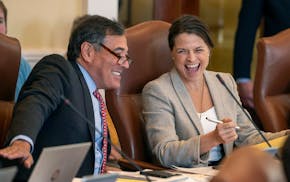It's hurry up and wait time for health care reform in Minnesota.
The new DFL majorities in the Legislature are rushing to enact the next stages of the federal Affordable Care Act. On Wednesday, the new health insurance exchange legislation begins working its way through the first of many committees it will have to clear in the next two months. The Senate State and Local Government Committee will take up discussion on the bill, which will create an online marketplace where more than 1 million Minnesota residents and businesses will be able to shop for health insurance, starting next year.
But while health insurance legislation rushes to meet its March deadline, other parts of the health care jigsaw are on hold, waiting for the federal government to act.
The Affordable Care Act offers states the option of putting in a federal alternative to programs like MinnesotaCare, which serves people under age 65 who make too much to enroll in Medicaid but not enough to afford private insurance. Yet frustrated Minnesota officials can't make that decision because the Obama administration has not yet revealed how the federal alternative would work, how much it would cost and other crucial details.
On Friday, U.S. Sen. Al Franken, D-Minn., met with legislators and pledged to help shake some answers out of Washington and act as a conduit between federal officials and the people in the state scrambling to carry out their reforms.
"It's very important that Minnesota implement the Affordable Care [Act] in a way that serves the people of Minnesota and becomes a model for the rest of the country," Franken told reporters after the meeting. "There's been a little frustration about getting the regulations" from the U.S. Department of Health and Human Services.
"Minnesota is an incredible leader in health care," he said. "We're number one in the country, according to Health and Human Services and I admire the work they've been doing."
As Franken spoke, state Health Commissioner Lucinda Jesson was in Washington meeting with HHS officials herself to try and learn details about the Basic Health Plan -- the federal version of MinnesotaCare. Back in Minnesota, legislators said they were eager to see the federal framework for all those reforms they want to pass.
"If we're going to succeed in the implementation of the Affordable Care Act -- which our health-care community and our state Legislature is ready to do; we're ready to be the nation's shining example of what a real embracing of health care reform broadly can mean for the people Minnesota -- we're going to need that strong state-federal partnership," said Sen. Tony Lourey, DFL-Kerrick, who authored the Senate version of the health-insurance exchange legislation.
JENNIFER BROOKS
Tax revenues upMinnesota's tax collections outpaced projections the final two months of 2012, adding an additional $114 million to the state's general fund. Unexpectedly robust corporate income tax collections accounted for most of the new money, about $93 million, according to Minnesota Management and Budget. Individual income tax collections were slightly higher than predicted, but they were offset by sales tax receipts that were off 5.1 percent during the holiday shopping season. Minnesota Management and Budget cautioned that the uptick in tax revenue was likely the result of one-time items, not any significant upswing in the economy.
BAIRD HELGESON
The week aheadThe Legislature is back in session. To track all the committee meetings and floor schedules, visit www.leg.state.mn.us/calendarday.aspx.

Biden scores endorsements from Kennedy family, looking to shore up support against Trump and RFK Jr.
The Latest | Seated juror in hush money trial excused as prosecutors ask judge to sanction Trump
Former Wisconsin Democratic Rep. Peter Barca announces new bid for Congress

